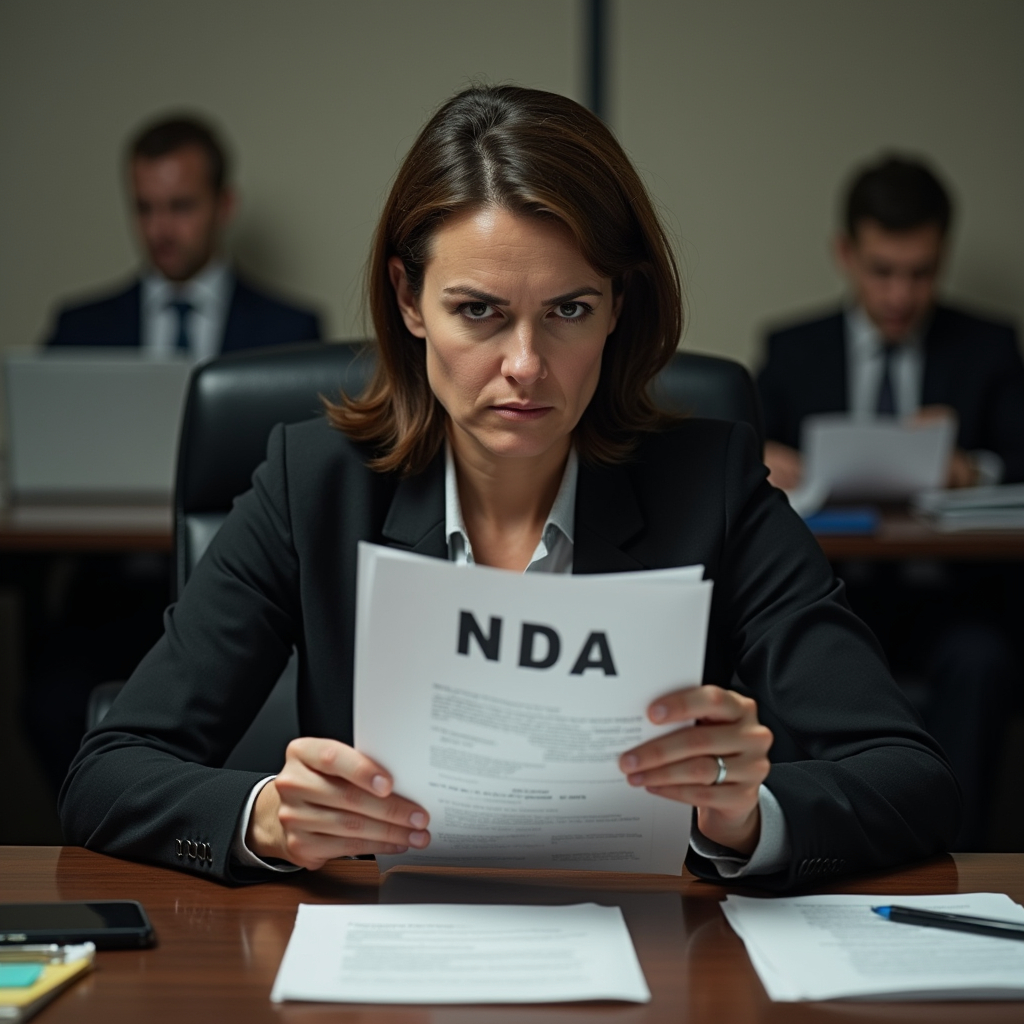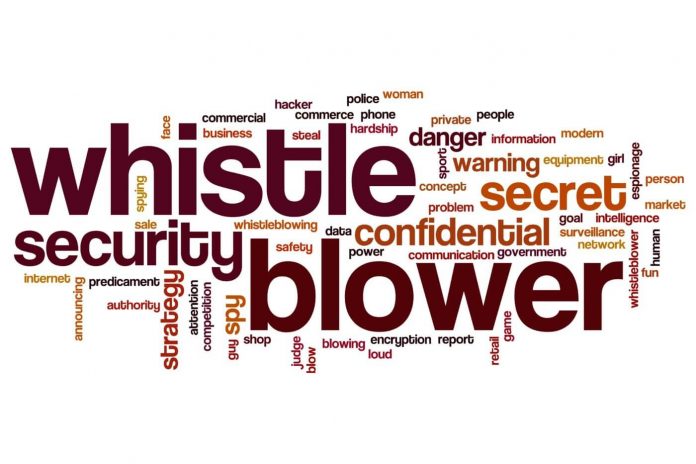This article has been written by Harshala Keny pursuing a Diploma in International Contract Negotiation, Drafting and Enforcement from LawSikho.
This article has been edited and published by Shashwat Kaushik.
Table of Contents
Introduction
OpenAI whistleblower recently reported to the U.S. Securities and Exchange Commission about the overly restrictive NDAs (non-disclosure agreements) issued by OpenAI to its employees, which raise penalties against the employees for reporting their concerns regarding the company to the federal authorities. On the other hand, the US State Department criticised Julian Assange, the founder of WikiLeaks, a whistleblowing service, saying that he acted as a conduit for Russia. Hence, it becomes important to understand what a whistleblower is, who can be seen affecting a company as well as becoming a concern on an international level as well as to the US. This article thus focusses on giving an insight into the whistleblowers in the US and the Act protecting them.
Who is a whistleblower
Whistleblowers play a crucial role in safeguarding society by exposing wrongdoing, misconduct, and illegal activities within organisations, corporations, or institutions. They are individuals who possess the courage to step forward and report unethical or unlawful practices that they witness in their workplaces.
While whistleblowers are often associated with revealing corporate misdeeds, their efforts extend beyond businesses alone. They may also come from government agencies, non-profit organisations, or even academic institutions. Regardless of their specific sector, whistleblowers share a common goal: to bring attention to wrongdoing and hold those responsible accountable.
The decision to become a whistleblower is not taken lightly. Whistleblowers often face significant personal and professional risks, including retaliation, harassment, and even threats to their safety. Despite these risks, they choose to speak out because they believe that it is the right thing to do.
Whistleblowers often have intimate knowledge of the inner workings of the organisations they work for. They may have witnessed firsthand the manipulation of financial records, the violation of environmental regulations, or the mistreatment of employees. Their unique perspective allows them to provide valuable insights into the wrongdoing that would otherwise remain hidden.
The impact of whistleblowers on society cannot be overstated. Their actions have led to the exposure of major scandals, the recovery of stolen funds, and the implementation of new laws and regulations to protect the public. Whistleblowers have also helped to raise awareness about important issues, such as corporate greed, government corruption, and human rights abuses.
While whistleblowers deserve recognition and support for their bravery, they often face significant challenges. Many countries lack adequate legal protections for whistleblowers, leaving them vulnerable to retaliation and reprisal. Additionally, cultural and societal stigmas surrounding whistleblowing can deter individuals from coming forward.
Protecting whistleblowers is essential to fostering a culture of transparency and accountability. Governments, organisations, and individuals must work together to create a safe and supportive environment for those who choose to speak out against wrongdoing. This includes implementing strong whistleblower protection laws, providing access to legal and financial assistance, and promoting a culture of respect and appreciation for whistleblowers.
By empowering whistleblowers, we empower society to hold those in power accountable and work towards a fairer, more just world.
Importance of whistleblowers
A whistleblower plays a crucial role in exposing wrongdoing and safeguarding the public interest. Here’s why a whistleblower is important:

- Uncovering misconduct and illegal activities: Whistleblowers bring to light specific instances of misconduct or illegal activities that might otherwise remain hidden. They often have firsthand knowledge of unethical or unlawful practices within organisations, government agencies, or corporations. By speaking up, they help uncover fraud, corruption, abuse of power, and other serious issues.
- Promoting accountability: Whistleblowers help hold those in positions of power accountable for their actions. Their disclosures can lead to investigations, legal proceedings, and disciplinary actions against individuals or entities engaged in wrongdoing. Whistleblowers’ courage to speak out sends a strong message that misconduct will not be tolerated and that those responsible will be held responsible.
- Protecting the public interest: Whistleblowers’ revelations can protect the public interest by preventing harm or exposing wrongdoing that could adversely affect society. For example, whistleblowers have played a vital role in uncovering environmental hazards, financial scandals, and public health crises. Their disclosures have contributed to policy changes, regulatory reforms, and improved safety measures that benefit the general public.
- Encouraging transparency and integrity: Whistleblowing promotes transparency and integrity within organisations and institutions. By exposing misconduct, whistleblowers encourage a culture of honesty and accountability, making it more difficult for wrongdoing to go unnoticed or unaddressed. Their actions set an example for others to come forward and report unethical or illegal activities, fostering a climate of ethical conduct.
- Promoting democratic values: Whistleblowers uphold democratic values by ensuring that the government and other institutions remain accountable to the citizens they serve. Their disclosures can help prevent the abuse of power, protect human rights, and ensure the fair and just operation of society. By speaking up, whistleblowers contribute to strengthening democratic principles and safeguarding the public’s trust in government and institutions.
- Empowering others to speak up: Whistleblowers’ courage and determination can inspire others to come forward and report wrongdoing. Their stories can raise awareness about the importance of whistleblowing and encourage individuals to speak up when they witness unethical or illegal behavior. By sharing their experiences, whistleblowers contribute to creating a more supportive environment for those considering disclosing misconduct.
Whistleblowers are vital to the proper functioning of a just and democratic society. Their willingness to expose wrongdoing, often at great personal risk, contributes to the uncovering of truth, the promotion of accountability, and the protection of the public interest.
History of whistleblowers in the US
The first whistleblowers in the US happened to be Mr. Samuel Shaw and Richard Marven, who reported to their leader about witnessing their commanding officer torturing British prisoners of war. A criminal libel suit was lodged against them by the officer. They sought help from the Continental Congress, which then enacted the first whistleblower protection law and helped them with defence as well as ordered the commander’s office to be fired. Both the whistleblowers won the case. Later in 1869, Abraham Lincoln enacted The False Claim Act, which even rewarded the whistleblowers for reporting the wrongdoings in the form of a percentage of the sum recovered from the entity in default.
However, in 2010, the Dodd-Frank Act was enacted, which further provided elaborate protection to the whistleblowers. It thus becomes important to analyse the reason for enacting the Dodd-Frank Act.
History behind the Dodd-Frank Act
The enactment of the Dodd-Frank Act lies in the US financial crisis of 2007-08, which had a global effect. This crisis underlined the necessity of authorities and entities that would help to prevent such crises in the future. To understand the solution provided by the Dodd-Frank Act, it is necessary to understand the problem by analysing the 2007-08 crisis. The reasons for the crisis are:
Lowering of the federal funds rate
In 2001, considering the dotcom implosion and the terrorist attack of September 11, 2001, the Federal Reserve anticipated a mild recession. As a result, it reduced the federal funds rate. The rate which was 6.5% in May 2000, was brought to 1.75 % in December 2001.
Mischief of the banks
This led the banks to extend consumer credits at lower prime rates (loans given to entities who have a good profile to repay them) and further to also lend to subprime borrowers (risky entities who might not be able to repay their loans). Subprime lending started in huge numbers, further leading to high liquidity in the market. People started buying houses. The prices of the houses rose way more than their actual costs. The buying of houses reached a saturation point. This was called the house bubble. Here, the banks played a notorious role in encouraging subprime borrowers to take loans without being transparent about the risks, knowing well that the subprime borrowers wouldn’t be able to repay the loans and in the growing inflation, they would profit by selling the mortgage. Banks bundled the subprime mortgages, less risky forms of consumer debts, and started selling them as securities (bonds) in the market. These mortgage-backed securities were called MBSs.

Partial repeal of the Glass-Steagall Act (1933)
In 1999, the partial repeal of the Glass-Steagall Act, which allowed the banks, securities firms, and insurance companies to enter each other’s markets and merge, created big companies that were too big to fail. The failure of them alone would collapse the economy drastically.
Weakening of net capital requirement
In 2004, the Securities and Exchange Commission weakened the net capital requirement for banks, which encouraged them further to buy mortgage-backed securities, which solely relied on their profits from the temporary bubble of inflation.
The increase in the federal reserve rate
Between June 2004 and June 2006, the federal reserve rate was increased from 1.25% to 5.25%. This caused a domino effect. Bank lending was reduced, market liquidity was reduced, and demand for houses was reduced. The prices of the houses fell drastically. The subprime lenders were unable to repay their loans even after selling their houses.
The decline in the value of mortgage-backed securities
The mortgage-backed securities, which were assets, became a huge loss to hold. These mortgage-backed securities were sold in other countries as well. These were sold to banks, hedge funds, and other money lenders. The “too big to fail” companies also held them. A steep decline in its value collectively pushed all these entities into huge losses.
Several policies were undertaken to stabilise the financial system, including the Troubled Asset Relief Program (TARP), where troubled assets were purchased and capital was injected into the banks, bailing out key institutions like AIG, carrying out mortgage relief programs, etc. But this was the treatment of the crisis. Steps were to be taken so that no such crisis would ever arise in the future, leading to the Dodd-Frank Act.
An overview of the Dodd-Frank Act
The Dodd-Frank Wall Street Reform and Consumer Protection Act, a landmark piece of financial reform legislation, was signed into law by President Barack Obama on July 21, 2010. Named after Senator Chris Dodd and Representative Barney Frank, the bill aimed to overhaul the financial system and prevent another financial crisis like the one that had occurred in 2008.
One of the key objectives of the Dodd-Frank Act was to increase transparency and accountability in the financial system. The act established the Financial Stability Oversight Council, a body comprised of financial regulators charged with identifying and addressing risks to the financial system. It also created the Consumer Financial Protection Bureau, an agency tasked with protecting consumers from abusive and deceptive financial practices.
The Dodd-Frank Act also included provisions to regulate derivatives, complex financial instruments that had played a significant role in the 2008 crisis. The act required derivatives to be traded on exchanges and cleared through central counterparties, reducing the risk of systemic failure.
In addition, the Dodd-Frank Act aimed to reduce the risk posed by large financial institutions. It imposed stricter capital requirements on banks and designated certain institutions as “systemically important,” subjecting them to heightened regulation.
The Dodd-Frank Act has been controversial since its passage. Critics have argued that it is too complex and burdensome and that it has stifled economic growth. Supporters, on the other hand, maintain that the act is necessary to prevent another financial crisis and protect consumers.
The Dodd-Frank Act has undergone several revisions since its passage. In 2018, Congress passed the Economic Growth, Regulatory Relief, and Consumer Protection Act, which made some changes to the Dodd-Frank Act, including repealing some provisions and easing regulations on smaller banks.
Despite these changes, the Dodd-Frank Act remains a significant piece of financial reform legislation, and it continues to play an important role in shaping the financial system. The key components of the Act are:
Creation of regulatory bodies and agencies
Creation of Financial Stability Oversight Council, which identifies and monitors the systemic risks to the financial system. It comprises representatives from various financial regulatory agencies and can take preventive actions against threats to financial stability. Creation of the Office of Financial Research, which collects data, conducts research, and provides analysis on systemic risks.
Enhanced oversight and regulation of financial institutions
Section 619 restricts the banks from engaging in proprietary trading and restricting their investments in hedge funds and private equity funds.
Setting higher net capital requirements for the banks so that they are well capable of absorbing such financial shocks on their own.

Regulation of derivatives markets
Under Title VII Wall Street Transparency and Accountability provision, the Securities and Exchange Commission and Commodities Futures Trading Commission were given the authority to regulate the over-the-counter derivatives. Regulators and clearing houses were to determine which contracts were to be cleared. The ones to be cleared required central clearing and exchange trading for derivatives. Data collection and publication by clearing houses and swap repositories ensured transparency in the market.
Consumer Financial Protection Bureau
CFPB was set up to protect consumers from the deceptive and abusive practices of the financial sector.
Title II: Orderly Liquidation Authority
Which enables the Federal Deposit Insurance Corporation to liquidate financial institutions that bear a systemic risk. However, the liquidation process is different from the traditional bankruptcy process.
Corporate governance and executive compensation
The shareholders’ influence on the pay practices was enhanced. The shareholders were granted a non-binding vote on executive compensation packages. The clawback provisions enabled companies to reclaim executive compensation in cases of misconduct.
Credit rating agencies
One of the reasons behind the 2007-08 financial crisis in the US was dishonest credit rating agencies rating mortgage-backed securities as per the convenience of the banks selling them. Hence, as given in the Act, these agencies are required to disclose their methodologies and rating performances, which increases transparency and accountability in credit rating agencies.
Mortgage Reform and Anti-Predatory Lending Act
Under Title IV, this Act specially regulates mortgage lending practices as well as also verifies the buyer’s mortgage repayment ability. It thus prohibits predatory lending practices, which was one of the reasons for the crisis.
Improving transparency and accountability
Financial institutions were required to be more transparent, especially concerning complex financial products and off-balance sheet exposures. Section 1502 mandates the companies to disclose their use of conflict minerals like tin, gold, tungsten, etc., which are sourced from regions that have been subject to human rights abuses.
Reforming the federal reserve
The Federal Reserve was now required to be more transparent by providing reports to Congress of their decision-making process, emergency lending programs, and other measures taken for financial stability.
Protection for the investors
The office of the Investor Advocate has been created under the Securities and Exchange Commission, which provides assistance to retail investors and addresses complaints of the investors. Under Section 922, strong protections have been provided to the whistleblowers, which is elaborately studied hereafter.
Whistleblower provisions under the Dodd-Frank Act
The provisions devoted to the protection of whistleblowers can be primarily found in Section 922 of the Act. As a result of this section, the Securities Exchange Act was also amended by adding Section 21 F to it. This section contains several provisions that incentivise and protect whistleblowers, which are listed below:
Monetary rewards
Monetary rewards are granted to the whistleblowers with original information on the violations of the companies. The reward is only granted when the monetary sanction exceeds 1 million USD and has been successfully enforced. The reward ranges between 10 and 30% of the total sanctions collected. This encourages individuals having knowledge of the securities violations within their company to be whistleblowers and report this to the Securities and Exchange Commission.
Confidentiality protection
The Act emphasises strong confidentiality protections by setting provisions that ensure the identity of the whistleblowers remains confidential. This encourages whistleblowers to come forward without the fear of retaliatory actions. However, there are certain exceptions to the same, which are as follows:
Disclosure to other government agencies and authorities
The Securities and Exchange Commission can disclose it to other government authorities like the Department of Justice (DOJ) or other federal or state regulatory bodies as well as self-regulatory organisations such as FINRA (Financial Industry Regulatory Authority). However, it is essential for them to have a legitimate law enforcement or regulatory interest in the information.
Disclosure in legal proceedings
When an enforcement action is to be pursued, in such circumstances the information can be disclosed in the legal proceedings. For instance, if the Securities and Exchange Commission pursues a legal action against the company before the court, it can reveal the information. Moreover, if the whistleblower files a suit for retaliation under the provisions of the Dodd-Frank Act, in such cases also the information can be disclosed.

Public Company Accounting Oversight Board
The information can be shared with PCAOB by the Securities and Exchange Commission, especially when it comes to violations of audit and accounting standards for it helps in its oversight and enforcement activities.
Criminal prosecutions
The Securities and Exchange Commission can provide the information to the criminal prosecutors where criminal violations can be seen and that might help in the criminal case that the prosecutor might be dealing with.
Congressional requests
The information can be disclosed to Congress or any committee or subcommittee considering they have oversight and investigatory powers.
Waiver by the whistleblower
When the whistleblower consents or permits the disclosure, understanding well about the tentative consequences, in such cases the information can be disclosed.
Self-disclosure by the whistleblower
When the whistleblower themselves disclose their identity publicly, in such cases the Securities and Exchange Commission will be unable to protect the confidential information.
Compliance with legal obligations
The Securities and Exchange Commission may be required to disclose the information to comply with its legal obligations, like a court order asking for the same or subpoenas. In such cases, it becomes the duty of the Securities and Exchange Commission to provide the same.
Regulatory reporting
The Securities and Exchange Commission, when required to disclose the information to comply with the regulatory reporting requirements, is under the obligation to provide the information for the same.
Anti-retaliation protections
The Act provides robust anti-retaliation protection provisions that protect the employee from retaliatory action by the employer for reporting its misconduct. It also enables the employee to file a lawsuit against the employer for such retaliatory actions before the federal court. It also makes the employee eligible for reinstatement, back pay, and compensation for such expenses incurred for the action undertaken.
Direct reporting to the securities and exchange commission
Unlike the Sarbanes-Oxley Act, which requires the whistleblowers to first report the violations to the regulatory authorities, under the Dodd-Frank Act, the whistleblower can directly report to the Securities and Exchange Commission about the misconduct.
Impact of the Dodd-Frank Act on the protection of the whistleblowers
In 2011, the Securities and Exchange Commission’s Office of the Whistleblower was established. Since then, the Act has had a huge impact, with several cases being reported courageously, which followed successful enforcement actions and then substantial monetary rewards to the whistleblowers. The impact of the Act can be summarised as follows:
Increased reporting and enforcement
A substantial increase in the reporting of violations by whistleblowers has been reported by the Securities and Exchange Commission, with a splendid 6900 whistleblower tips in the fiscal year 2020 alone. This has resulted in the detection of several violations and the imposition of monetary sanctions in billions of dollars.
High-profile cases
Several high-profile cases were also reported which indicates that there is no corruption that has infiltrated this system yet. For instance, in 2012, a whistleblower received a whopping 50 million dollar reward for providing information that led to the successful enforcement of sanctions against JPMorgan Chase. The tip of the whistleblower exposed the failure of the bank to disclose material information to the investors, which resulted in significant penalties and remedial actions.
In another notable case, a whistleblower was rewarded with 38 million dollars in 2018 for reporting violations in securities law that resulted in substantial harm to the investors.
Legal challenges and clarifications
The Dodd-Frank Act faced several legal challenges against the anti-retaliatory protection provided by it. In Digital Realty Trust, Inc. vs. Somers (2018), it was clarified by the US Supreme Court that the anti-retaliatory protection will be provided to the whistleblowers only when they report to the Securities and Exchange Commission directly and not when the reporting has been done internally. Hence, it paved the way for the whistleblowers to understand the course of action that they have to take in case they witness a violation.

Criticisms and areas of improvement
While the Dodd-Frank Act is widely successful, it is not void of any criticisms. Some of the criticisms that this Act faces are:
Lengthy processing times
It takes several years to process the claims of the whistleblowers, leading to a delay in the issuance of their rewards and resolution of enforcement actions. Streamlining the review and approval process may enhance the efficacy of the program.
Scope of coverage
The Supreme Court’s decision in Digital Realty Trust, Inc. vs. Somers highlighted a gap in the protection of the whistleblowers reporting internally. Hence, it is necessary to extend the anti-retaliatory protection to such whistleblowers as well.
Public awareness
Despite such rewards received and such protection provided by the Dodd-Frank Act very few know about it. Enhanced outreach and education efforts will help potential whistleblowers to be aware of the rights and mechanisms available for reporting securities violations.
Conclusion
The Dodd-Frank Act is a significant step in providing protection to whistleblowers, rewarding them, and an effective tool to detect violations of securities law in the complex web of several corporate bodies. The crisis of 2007-08 brought a distrust among the investors to invest in the US. Enforcement of the Dodd-Frank Act reinstated belief in the US economy, inviting investments in the same.
The Dodd-Frank Act helps in projecting a crisis-proof economy with authorities assessing and avoiding systemic risks, building confidence in the US economy. It is pertinent to understand that the genuine protection to the whistleblowers and the rewards to them as promised by the Act is one of the important pillars to its success, as it helped to uproot the deceptive activities from the very corners of the corporate sectors where it is difficult for the state authorities to reach.
References
- https://www.cftc.gov/sites/default/files/idc/groups/public/@swaps/documents/file/hr4173_enrolledbill.pdf
- https://www.livemint.com/companies/news/openai-whistleblowers-update-letter-ask-us-sec-regulator-examine-employees-ndas-non-disclosure-agreement-company-chatgpt-11721102291389.html
- https://www.financialexpress.com/world-news/us-state-department-condemns-julian-assanges-actions-following-whistleblowers-release/3536232/
- https://www.employmentlawgroup.com/timeline-us-whistleblowing/
- https://www.federalreserve.gov/newsevents/speech/bernanke20100103a.htm
- https://fraser.stlouisfed.org/title/banking-act-1933-glass-steagall-act-991
- https://www.forbes.com/advisor/investing/fed-funds-rate-history/
- https://www.investopedia.com/terms/t/troubled-asset-relief-program-tarp.asp
- https://www.investopedia.com/terms/f/financial-stability-oversight-council.asp
- https://www.investopedia.com/terms/v/volcker-rule.asp
- https://www.law.cornell.edu/wex/dodd-frank_title_vii_-_wall_street_transparency_and_accountability
- https://www.consumerfinance.gov/about-us/the-bureau/
- https://www.fdic.gov/sites/default/files/2024-04/spapr1024b_0.pdf
- https://scholarship.law.umn.edu/cgi/viewcontent.cgi?article=1084&context=faculty_articles
- https://files.consumerfinance.gov/f/201503_cfpb_truth-in-lending-act.pdf
- https://www.sec.gov/comments/s7-40-10/s74010-547.pdf
- https://www.sec.gov/files/dodd-frank-sec-922.pdf
- https://www.sec.gov/newsroom/press-releases/2023-161
- https://www.sec.gov/files/2020_owb_annual_report.pdf
- https://www.reuters.com/article/breakingviews/sec-approves-50-000-payout-under-new-whistleblower-program-idUSBRE87K0UB/
- https://www.sec.gov/files/OW_2019AR_FINAL_508’d.pdf
- https://supreme.justia.com/cases/federal/us/583/16-1276/
 Serato DJ Crack 2025Serato DJ PRO Crack
Serato DJ Crack 2025Serato DJ PRO Crack










 Allow notifications
Allow notifications


